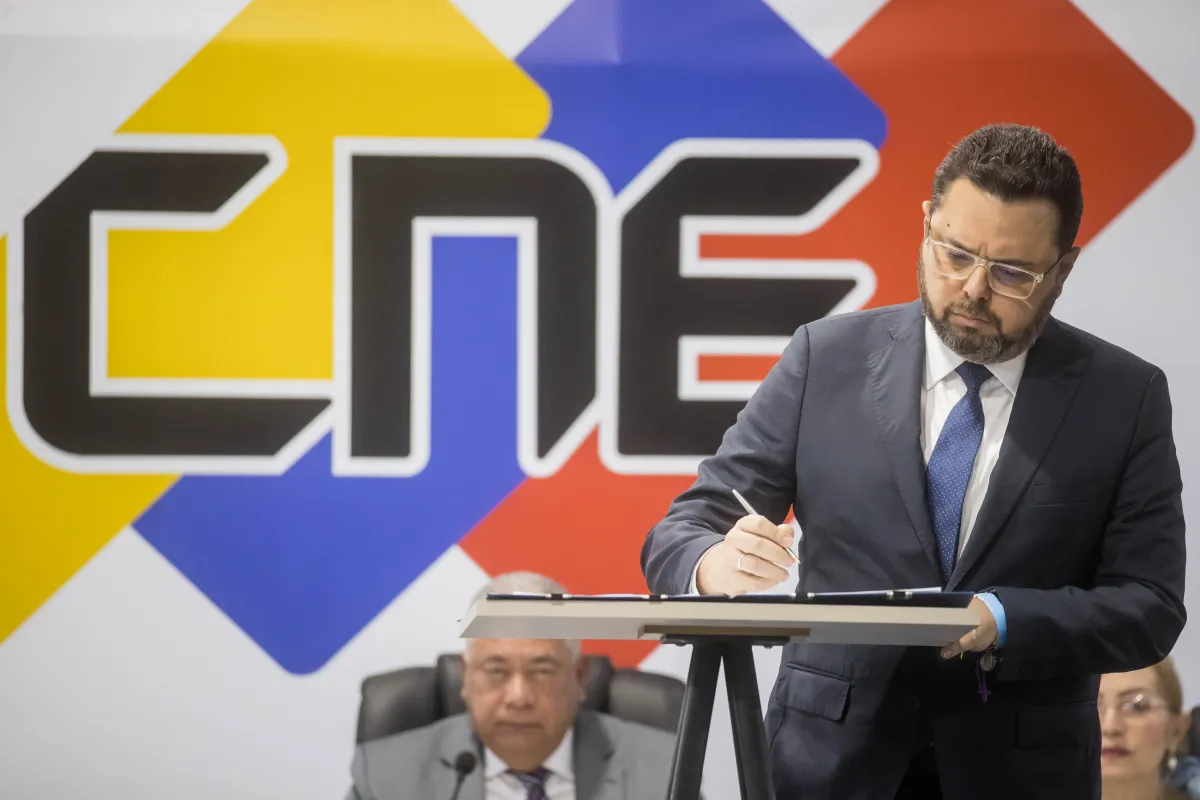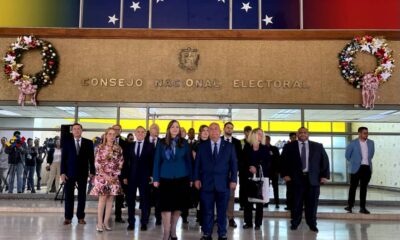International
Venezuelan candidate Ecarri says that the electoral agreement opens a new democratic stage

The opposition Antonio Ecarri, candidate for the Presidency of Venezuela, said on Friday that the agreement to recognize the electoral result, proposed by the Government and signed on Thursday by eight of the ten candidates before the National Electoral Council (CNE), is the beginning of a “new democratic stage” in the country.
“Yesterday’s photo, for me, is the beginning of a new democratic stage, of coexistence of all sectors,” said the anti-chavista – who declares himself “independent” -, according to a press release from the Alianza Lápiz, the formation for which he is presented to the presidential elections.
Ecarri criticized the absence, at the headquarters of the CNE, of the candidates Enrique Márquez, from the Centrados party, and Edmundo González Urrutia, standard-bearer of the main anti-Chavista coalition, Plataforma Unitaria Democrática (PUD).
“It is an absurd and clumsy bad silt to play with the policies of absences in Venezuela,” Ecarri said.
Ecarri added that it is “unacceptable” to be the “guarantor of a change in peace, without being part of the agreements.”
“How are you going to lead the pacification of a country and a change in peace if you don’t go? Those absence policies, I particularly don’t like them, that absence has a swew of cowardice,” he said.
Eight of the ten candidates for the July 28 elections in Venezuela, including President Nicolás Maduro, signed on Thursday, before the CNE, an agreement that obliges them to recognize the result that the governing body of the elections announced after the count, leaving no room for claims.
Enrique Márquez said this Friday that the recognition agreement is “useless,” since it is “redundant” and “incomplete.”
Márquez also criticized, during a press conference, that the agreement is “unilateral,” having not been able to “give an opinion and discuss its content” all the candidates, as – he assured – was his case, which is why he refused to go to the CNE and sign the document.
Meanwhile, González Urrutia said on Thursday that he was not invited to sign the agreement, which he had previously rejected, saying that the recognition of the results is already contemplated in the Barbados Agreement, signed between the PUD and the Government in October.
International
U.S. Senate Rejects Budget, Bringing Government Closer to Shutdown Amid DHS Dispute

The U.S. Senate voted on Thursday against a budget proposal in a move aimed at pressuring changes at the Department of Homeland Security (DHS), following the killing of two civilians during a deployment of immigration agents in Minneapolis.
All Senate Democrats and seven Republican lawmakers voted against the bill, which requires 60 votes to advance, pushing the country closer to a partial government shutdown that would cut funding for several agencies, including the Pentagon and the Department of Health.
The rejection came as Senate leaders and the White House continue negotiations on a separate funding package for DHS that would allow reforms to the agency. Proposed measures include banning Immigration and Customs Enforcement (ICE) agents from wearing face coverings and requiring them to use body-worn cameras during operations.
The vote took place just hours after President Donald Trump said he was “close” to reaching an agreement with Democrats and did not believe the federal government would face another shutdown, following last year’s record stoppage.
“I don’t think the Democrats want a shutdown either, so we’ll work in a bipartisan way to avoid it. Hopefully, there will be no government shutdown. We’re working on that right now,” Trump said during a Cabinet meeting at the White House.
International
Trump Says Putin Agreed to One-Week Halt in Attacks on Ukraine Amid Extreme Cold

U.S. President Donald Trump said on Thursday that he secured a commitment from Russian President Vladimir Putinto halt attacks against Ukraine for one week, citing extreme weather conditions affecting the region.
“Because of the extreme cold (…) I personally asked Putin not to attack Kyiv or other cities and towns for a week. And he agreed. He was very pleasant,” Trump said during a Cabinet meeting broadcast by the White House.
Trump acknowledged that several advisers had questioned the decision to make the call.
“A lot of people told me not to waste the call because they wouldn’t agree. And he accepted. And we’re very happy they did, because they don’t need missiles hitting their towns and cities,” the president said.
According to Trump, Ukrainian authorities reacted with surprise to the announcement but welcomed the possibility of a temporary ceasefire.
“It’s extraordinarily cold, record cold (…) They say they’ve never experienced cold like this,” he added.
Ukrainian President Volodymyr Zelensky later commented on the announcement, expressing hope that the agreement would be honored.
International
Storm Kristin Kills Five in Portugal, Leaves Nearly 500,000 Without Power

Storm Kristin, which battered Portugal with heavy rain and strong winds early Wednesday, has left at least five people dead, while nearly half a million residents remained without electricity as of Thursday, according to updated figures from authorities.
The revised death toll was confirmed to AFP by a spokesperson for the National Emergency and Civil Protection Authority (ANPEC). On Wednesday, the agency had reported four fatalities.
Meanwhile, E-Redes, the country’s electricity distribution network operator, said that around 450,000 customers were still without power, particularly in central Portugal.
Emergency services responded to approximately 1,500 incidents between midnight and 8:00 a.m. local time on Wednesday, as the storm caused widespread disruptions.
The Portuguese government described Kristin as an “extreme weather event” that inflicted significant damage across several regions of the country. At the height of the storm, as many as 850,000 households and institutions lost electricity during the early hours of Wednesday.
Several municipalities ordered the closure of schools, many of which remained shut on Thursday due to ongoing adverse conditions.
Ricardo Costa, regional deputy commander of the Leiria Fire Brigade, said residents continue to seek assistance as rainfall persists.
“Even though the rain is not extremely intense, it is causing extensive damage to homes,” he noted.
In Figueira da Foz, a coastal city in central Portugal, strong winds toppled a giant Ferris wheel, underscoring the severity of the storm.
-

 International4 days ago
International4 days agoU.S. Senate Rejects Budget, Bringing Government Closer to Shutdown Amid DHS Dispute
-

 Central America3 days ago
Central America3 days agoPanama Supreme Court Strikes Down Panama Ports Concession as Unconstitutional
-

 International4 days ago
International4 days agoStorm Kristin Kills Five in Portugal, Leaves Nearly 500,000 Without Power
-

 Central America3 days ago
Central America3 days agoU.S. and Guatemala Sign Trade Deal Granting Zero Tariffs to Most Exports
-

 International4 days ago
International4 days agoMan Arrested After Vehicle Crashes Into Jewish Institution in Brooklyn
-

 International4 days ago
International4 days agoTrump Says Putin Agreed to One-Week Halt in Attacks on Ukraine Amid Extreme Cold
-

 Central America1 day ago
Central America1 day agoCosta Rica Goes to the Polls as Voters Choose Continuity or Change




























